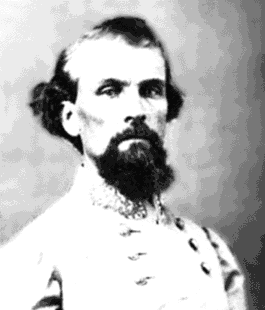Instead of challenging Federal forces at Loudon, the Confederates withdrew on the 29th, with Wolford and Byrd giving pursuit. On the morning of the 30th the two brigades spurred their horses at a trot south to Philadelphia. On their arrival, they formed a line to the face the Confederates, whom they had heard were moving in large numbers on a road to the east. The enemy did not give battle, however, and Wolford and Byrd again headed south, camping two miles below Sweet Water on October 1 and in the vicinity of Athens on October 2. Meanwhile, Forrest had split his troops, sending three brigades south to join Wheeler, while leaving two, under George G. Dibrell and John Pegram, to harass Wolford and Byrd until a larger army could thrust north and drive Burnside and his Federals from East Tennessee. Hearing from his scouts that a large force of rebel cavalry was assembling -- estimates ranged from 15,000 and 20,000 men -- Wolford, then in command, decided to fall back to Mouse Creek Station on October 4th and to Sweet Water on the 5th. Here the two brigades separated, with Byrd going to his former position west of Kingston, a town north of the Tennessee River, and Wolford remaining in Sweet Water. The 45th, under Lieutenant Colonel George E. Ross, which had been assigned to Byrd's brigade, was detached to Wolford's. "We had served with these men at Dutton Hill, Ky., on the Morgan raid through the Northern States, and we felt like a band of brothers," noted Tarrant (Wild Riders, 290). Also, joining Wolford at Sweet Water was the 112th Illinois, whose men Tarrant lauded as "no better soldiers in the Union Army" (ibid, 290). |

The rest of the regiment, however, saw relatively little action until the Battle of Chickamauga on September 19 and 20th, which ended with the victory of Confederate general Braxton Bragg and the retreat of his Union foe, William Rosecrans, into Chattanooga. More importantly for the 45th, rebel cavalry advanced north against Byrd's brigade, which was operating below Athens. When Byrd called for reinforcements, Wolford sent detachments from the 1st Kentucky, 11th Kentucky and 45th, the last under Captain John H. Humphrey. On the 25th Byrd encountered the cavalry corps of Lieutentant General Nathan B. Forrest south of Hiwassee River, at the junction of the Dalton and Cleveland roads. After brisk skirmishing, the Confederates attempted to flank the Union forces from both sides. Under severe pressure, the Federals withdrew across the river. Instead of pursuing them, Forrest held his ground. |
At daylight on the 26th Byrd sent out a reconnoitering party led by Captain Irvine Burton of the 1st Kentucky, accompanied by detachments from the 11th Kentucky and the 45th, the latter under Humphrey. At nine a.m. Byrd received a dispatch from Humphrey saying that he had been attacked, and sent out two companies from the 112th Illinois under Major Tristram T. Dow to reinforce him. Meanwhile, Byrd prepared to receive the enemy, though his position on the north side of the river -- bottom land facing a range of hills to the south -- was not a good one. Around noon Forrest attacked with nearly 5,000 men (Byrd's estimate was 8,000) and, after two hours of fighting, threatened to turn the Union flanks. Seeing his danger, Byrd withdrew north on the road to Athens, with the 112th Illinois and 8th Michigan guarding his rear. Meanwhile, Wolford moved his brigade south of Athens to meet Byrd's retreat. The two commanders were able to join forces two miles south of the town and, after an hour's fight, repel the rebel advance. |
Brig. Gen. Nathan B. Forrest |
Knowing Forrest's advantage in numbers and concerned about his exposed position, Byrd persuaded Wolford to withdraw rather than pursue the retreating enemy. The two brigades retired to Sweet Water on the 27th and, after detecting rebel forces moving up on their flank, to Loudon on 28th, where they rejoined forces under Brigadier General Julius White, the commander of the 23rd Corp's Second Division. |
Though Forrest was able to successfully repel the Federal cavalry thrust, he stirred the wrath of his superior, Braxton Bragg, who considered this foray, made without consultation, an act of insubordination. On September 28 he ordered Forrest to turn over his troops to General Joseph Wheeler. Enraged at what he considered the latest in a series of attempts by Bragg to belittle his accomplishments and sabotage his career, Forrest confronted his superior in his headquarters, called him a scoundrel and coward, among other epithets, and soon after applied for a transfer, which was promptly granted. As result the 45th faced Forrest's men, but not Forrest himself, at the Battle of Philadelphia. |
Maj. Gen. Braxton Bragg |
